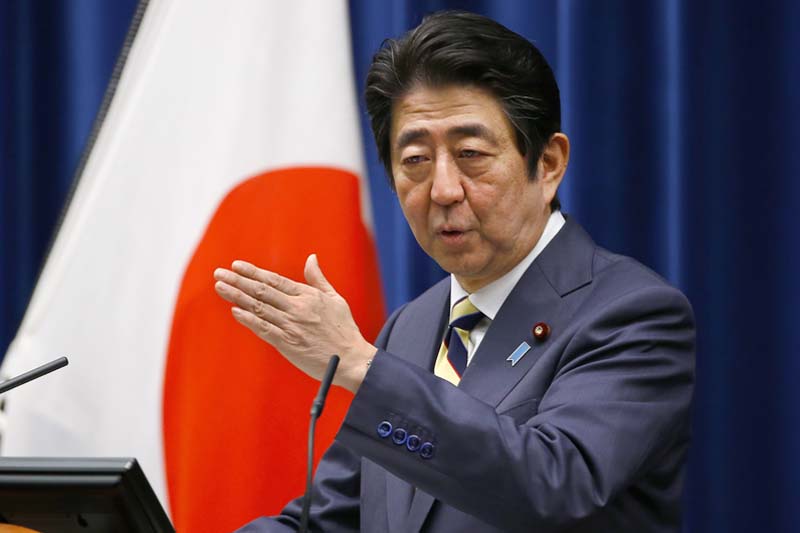PM Abe seeks to burnish legacy for election
TOKYO: Japanese Prime Minister Shinzo Abe, stymied by a still sputtering economy, is seeking to burnish his legacy and shore up support ahead of an election in the summer.
"Challenges, challenges and still more challenges," Abe said in summing up the coming year in a nationally televised news conference Monday.
Abe said he expects to make progress on sweeping reforms he has promised, likening himself to the 18th-century "Abarenbo Shogun," or "Rogue General" Tokugawa Yoshimune, a national leader renowned for his efforts to reduce waste, clean up corruption and instill samurai values of discipline and leadership.
Until July, Abe's focus is bound to be on ensuring victory in the election for the Upper House of parliament in July, said Michael Cucek, an expert on Japanese politics who teaches at Tokyo's Waseda University.
Abe's position is strong, with backing by the coalition partner Komeito, and the opposition has failed to regain much traction after a resounding loss of power to Abe's conservative Liberal Democrats in December 2012.
But local political superstition holds that every nine years a setback in Upper House election forces the prime minister to step down. "Observers will be watching closely to see whether he is able to break the jinx," the Jiji news agency said in a commentary Monday.
Given the slow pace of the economic recovery so far, with inflation still nowhere near the government's 2 percent goal and wages and spending still in the doldrums, Abe has been highlighting more obvious progress on the diplomatic front.
Three years of relentless overseas travel have helped restore some of the stature Japan ceded during the past two decades of economic malaise, winning Abe widespread respect at home.
In an address to parliament's opening session on Monday, Abe pointed to concrete results from those travels, including the recent sale of Japanese high-speed train technology to India.
Last week, the government reached an agreement with neighboring South Korea on the issue of women forced into sexual slavery for Japanese troops during World War II. Abe also said on Monday that he hoped for talks with Russian President Vladimir Putin on a territorial dispute that, 70 years after the war's end, is still preventing Tokyo and Moscow from signing a peace treaty.
Abe said he hoped Japan's hosting in May of the summit of the Group of Seven industrial nations in Ise, scenic islands in central Japan, would prove a turning point for the global economy.
Abe acknowledged that his efforts to get the economy fully into recovery mode were only "halfway there."
The good news: Share prices are up nearly 77 percent from early 2013, with a 9.1 percent gain for 2015. At about 120 yen per US dollar, the currency remains favorably weak for exporters, the jobless rate is near 3 percent and corporate profits have been surging to new highs.
But Japan narrowly avoided a recession in 2015 and the latest vital signs were weak: Factory output fell in November, as did household spending and incomes. The year started on a sour note, as the Nikkei dropped nearly 3 percent in its 2016 opening session.
The prime minister's evolving pre-election strategy spans both short-term populist priorities and broader, longer-term aims meant to counter angst over Japan's aging and shrinking population.
On top of his earlier "Abenomics" policies of lavish monetary easing and reforms meant to improve productivity and competitiveness, Abe has promised a rise in the minimum wage and one-time stipends of 30,000 yen (about $250) each for low-income pensioners and the disabled — constituencies that barely have benefited from the Abenomics-related run-up in stock prices.
The Liberal Democrats and Komeito recently agreed to exempt most food items from a planned sales tax hike in 2017 — a concession bound to win favor with pensioners and young families that are just scraping by.
More ambitiously, Abe has pledged to help the economy expand to 600 trillion yen ($5 trillion) by 2020, an increase of about 14 percent from 2014. He also wants to raise Japan's birth rate to 1.8 children per woman from the current level of about 1.4, and to ensure workers will not have to leave their jobs to care for their parents — a growing concern in a country where more than a third of the population is over the age of 65.
Many in Tokyo's political world are speculating that Abe is worried enough about the economy to postpone, once again, next year's hike in the sales tax to 10 percent from the current 8 percent. He earlier delayed it by a year and a half, to April 2017.
Another postponement would be a gamble: Japan's gross national debt is highest relative to its GDP among major industrial nations, at more than twice the size of the economy. But with tax revenues projected to hit a 25-year peak in 2015, he may be betting that option would be less risky than a repeat of the battering the economy took after the last sales tax hike, in April 2014.






